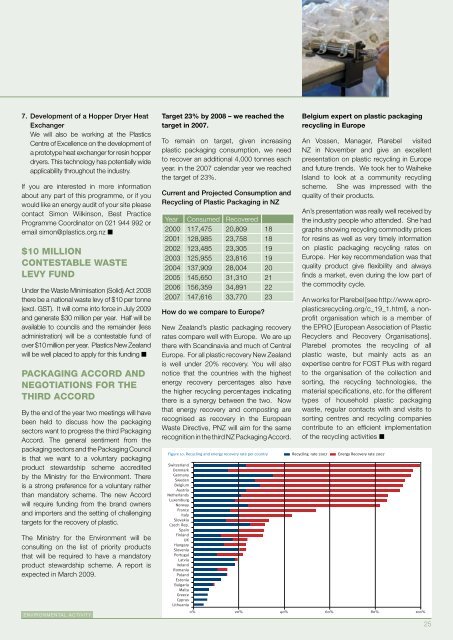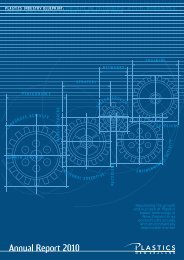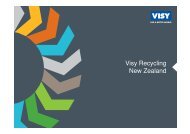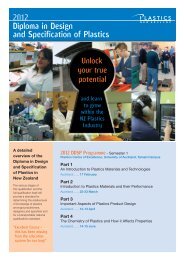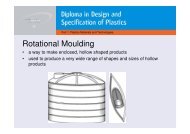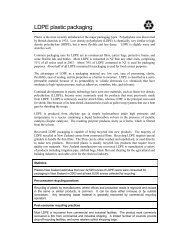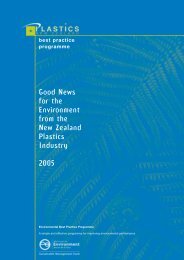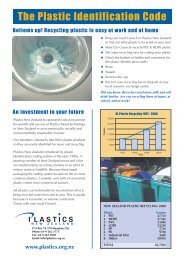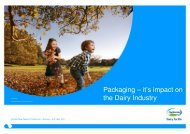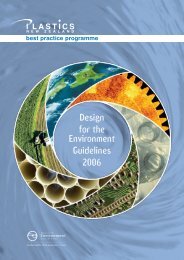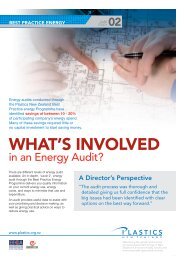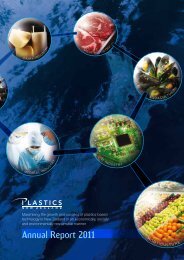Annual Report 2009 - Plastics New Zealand
Annual Report 2009 - Plastics New Zealand
Annual Report 2009 - Plastics New Zealand
Create successful ePaper yourself
Turn your PDF publications into a flip-book with our unique Google optimized e-Paper software.
7. Development of a Hopper Dryer Heat<br />
Exchanger<br />
We will also be working at the <strong>Plastics</strong><br />
Centre of Excellence on the development of<br />
a prototype heat exchanger for resin hopper<br />
dryers. This technology has potentially wide<br />
applicability throughout the industry.<br />
If you are interested in more information<br />
about any part of this programme, or if you<br />
would like an energy audit of your site please<br />
contact Simon Wilkinson, Best Practice<br />
Programme Coordinator on 021 944 992 or<br />
email simon@plastics.org.nz n<br />
$10 Million<br />
contestable waste<br />
levy fund<br />
Under the Waste Minimisation (Solid) Act 2008<br />
there be a national waste levy of $10 per tonne<br />
(excl. GST). It will come into force in July <strong>2009</strong><br />
and generate $30 million per year. Half will be<br />
available to councils and the remainder (less<br />
administration) will be a contestable fund of<br />
over $10 million per year. <strong>Plastics</strong> <strong>New</strong> <strong>Zealand</strong><br />
will be well placed to apply for this funding n<br />
Packaging Accord and<br />
negotiations for the<br />
third Accord<br />
By the end of the year two meetings will have<br />
been held to discuss how the packaging<br />
sectors want to progress the third Packaging<br />
Accord. The general sentiment from the<br />
packaging sectors and the Packaging Council<br />
is that we want to a voluntary packaging<br />
product stewardship scheme accredited<br />
by the Ministry for the Environment. There<br />
is a strong preference for a voluntary rather<br />
than mandatory scheme. The new Accord<br />
will require funding from the brand owners<br />
and importers and the setting of challenging<br />
targets for the recovery of plastic.<br />
The Ministry for the Environment will be<br />
consulting on the list of priority products<br />
that will be required to have a mandatory<br />
product stewardship scheme. A report is<br />
expected in March <strong>2009</strong>.<br />
ENVIRONMENTAL ACTIVITY<br />
<br />
Target 23% by 2008 – we reached the<br />
target in 2007.<br />
To remain on target, given increasing<br />
plastic packaging consumption, we need<br />
to recover an additional 4,000 tonnes each<br />
year. in the 2007 calendar year we reached<br />
the target of 23%.<br />
Current and Projected Consumption and<br />
Recycling of Plastic Packaging in NZ<br />
Year Consumed Recovered<br />
2000 117,475 20,809 18<br />
2001 128,985 23,758 18<br />
2002 123,485 23,305 19<br />
2003 125,955 23,816 19<br />
2004 137,909 28,004 20<br />
2005 145,650 31,310 21<br />
2006 156,359 34,891 22<br />
2007 147,616 33,770 23<br />
How do we compare to Europe<br />
<strong>New</strong> <strong>Zealand</strong>’s plastic packaging recovery<br />
rates compare well with Europe. We are up<br />
there with Scandinavia and much of Central<br />
Europe. For all plastic recovery <strong>New</strong> <strong>Zealand</strong><br />
is well under 20% recovery. You will also<br />
notice that the countries with the highest<br />
energy recovery percentages also have<br />
the higher recycling percentages indicating<br />
there is a synergy between the two. Now<br />
that energy recovery and composting are<br />
recognised as recovery in the European<br />
Waste Directive, PNZ will aim for the same<br />
recognition in the third NZ Packaging Accord.<br />
<br />
<br />
<br />
<br />
<br />
<br />
<br />
<br />
<br />
<br />
<br />
<br />
<br />
<br />
<br />
<br />
<br />
<br />
<br />
<br />
<br />
<br />
<br />
<br />
<br />
<br />
<br />
<br />
<br />
Belgium expert on plastic packaging<br />
recycling in Europe<br />
An Vossen, Manager, Plarebel visited<br />
NZ in November and give an excellent<br />
presentation on plastic recycling in Europe<br />
and future trends. We took her to Waiheke<br />
Island to look at a community recycling<br />
scheme. She was impressed with the<br />
quality of their products.<br />
An’s presentation was really well received by<br />
the industry people who attended. She had<br />
graphs showing recycling commodity prices<br />
for resins as well as very timely information<br />
on plastic packaging recycling rates on<br />
Europe. Her key recommendation was that<br />
quality product give flexibility and always<br />
finds a market, even during the low part of<br />
the commodity cycle.<br />
An works for Plarebel [see http://www.eproplasticsrecycling.org/c_19_1.html],<br />
a nonprofit<br />
organisation which is a member of<br />
the EPRO [European Association of Plastic<br />
Recyclers and Recovery Organisations].<br />
Plarebel promotes the recycling of all<br />
plastic waste, but mainly acts as an<br />
expertise centre for FOST Plus with regard<br />
to the organisation of the collection and<br />
sorting, the recycling technologies, the<br />
material specifications, etc. for the different<br />
types of household plastic packaging<br />
waste, regular contacts with and visits to<br />
sorting centres and recycling companies<br />
contribute to an efficient implementation<br />
of the recycling activities n<br />
<br />
<br />
ANNUAL REPORT <strong>2009</strong> PLASTICS NEW ZEALAND<br />
I<br />
<br />
25


